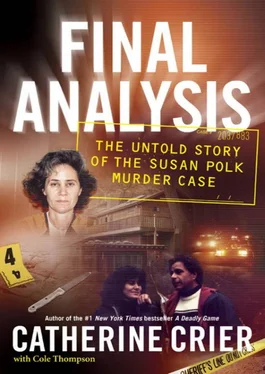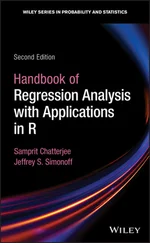“It’s about the truth, Mrs. Polk.”
Expressing frustration with the District Attorney’s implication that she “snapped” inside the guest cottage that October night, Susan insisted that “snapping” was not in her nature, but it was in Felix’s. Susan also pointed out that she had successfully argued against a court order requiring that she submit to a psychological evaluation before going to trial.
“I’m not going to play crazy,” she told jurors. “I’m not going to say I snapped when I didn’t. And I’m not going to pretend this D.A. isn’t out to frame me for murder and this judge’s rulings are not biased, when I believe they are.”
“You’ve used the words ‘shocked’ and ‘appalled’ many times, Mrs. Polk,” Sequeira told Susan during recross-examination. “But do you recall saying in an interview on Court TV that you talked about it in a joking voice—the different actresses that might play you in a movie?”
The prosecutor was referring to an April 2006 interview that aired on Catherine Crier Live, conducted by my senior producer and coauthor, Cole Thompson. During the conversation, Susan said for the first time that she might be losing her case in court. In a moment of levity, she also joked about the possibility of a movie being made about her life, leading her to speculate that Winona Ryder should play the younger Susan, while Susan Sarandon should play her older self.
Though at the time the humor seemed harmless, Sequeira was seeking to use that televised interview to portray her as someone who pokes fun at a murder victim.
“Is it a crime to be able to find some humor in my situation?” Susan asked the prosecutor, charging that the Court TV producer “sand-bagged” her with the question. Breaking into a girlish giggle, she admitted that she still believes that Hannibal Lector is “too nice” a character to portray Felix.
“This is funny to you?” Sequeira huffed.
“I thought so,” Susan chuckled. But her demeanor quickly changed when she realized that jurors were not laughing along with her. Turning on the tears, she reminded panelists of her serious nature as a child, her difficult years as a wife, and her mother’s mantra.
“Have a sense of humor!” Susan said her mother always told her.
“I could look at my life as a tragedy. Or I could see it as a triumph,” she said as the tears flowed and she gasped for breath. “And I made a conscious choice that no matter what happened in my life, I wasn’t going to be a victim.”
Before resting her case on Thursday, June 8, Susan would call a colorful assortment of witnesses to testify. Among them was Laura Castro-Shelly, a fifth-degree Shaolin black belt who used the “fight or flight” response to explain the relatively few bruises Susan sustained during the fight with her husband.
“I believe it’s animalistic,” Castro-Shelly responded when asked how a woman of Polk’s size and stature could survive such a brutal attack by someone so much larger than she. “You become a lioness in the wilderness. You will protect yourself. You will protect your babies…. You will fight back knowing this could be your last breath.”
Susan also sought to direct the court’s attention to the role that psychics can play in crime investigation, calling Roger Clark, a retired Los Angeles sheriff’s lieutenant and self-described psychic detective and expert in crime scene analysis to testify on her behalf. The former police lieutenant took the stand to bolster Dr. Cooper’s assertion that Felix died from a heart attack and not the massive injuries he sustained in the guest cottage. Similarly, Susan called psychic detective Annette Martin to testify; however, Judge Brady limited her testimony to a discussion of how her intuitive abilities are used by members of law enforcement—adding little to Susan’s defense. Susan touted Martin’s abilities, claiming she had a 100 percent success rate on the hundred cases she assisted on. “She testified because she cares about me,” Susan later said.
Next to take the stand was family therapist and domestic violence expert Linda Barnard who supported Susan’s claim that she was a victim of “physical, emotional, and verbal abuse” during her relationship with Felix. The expert admitted she had not conducted a psychological evaluation of Susan in jail, but instead, had based her conclusions on four meetings with the defendant at the West County Correctional Facility and a review of the case documents, including recorded interviews, medical records, and naval records on Felix Polk. In response to questions, Dr. Barnard asserted that Susan suffers from post–traumatic stress syndrome as a result of the ongoing abuse she endured during her relationship with Felix.
“Can you describe for the jury what a delusional disorder is?” Sequeira asked Barnard during the subsequent cross-examination.
Referring to the Diagnostic and Statistical Manual of Mental Disorders (DSM), she described someone who might be out of touch with reality, hold false beliefs, and experience hallucinations.
Clutching his own copy of the diagnostic manual, the prosecutor read aloud from a section on “persecutory type delusional disorder.”
“This subtype applies when the central theme of the delusion involves the person’s belief that he or she is being conspired against, cheated on, spied on, followed, poisoned or drugged, maliciously maligned, harassed. Small slights may be exaggerated,” the prosecutor read on. “The focus of the delusion is often some injustice that must be remedied by legal action.”
After a dramatic pause, Sequeira read the final line of the passage aloud: “Individuals with persecutory delusions are often resentful and angry and may resort to violence against those they believe are hurting them.”
“Is this an accurate portrayal of the disorder?” he asked.
Dr. Barnard nodded in agreement.
Sequeira didn’t ask if the description applied to Susan’s conduct; the jury would make the obvious connection on its own.
On the morning of Tuesday, June 13, Susan presented her closing arguments to the jury, ignoring the remarks prepared for her by Valerie Harris and some of her supporters. For months, Harris and several others, including former Miner Road homeowner Roger Deakins, had been holding roundtables at the Polk house to plot defense strategies. Deakins had come to court during several days of testimony to show his support for Susan. But once again, Susan would do things her way.
Before she began, Susan unsuccessfully protested Judge Brady’s imposition of a three-hour time limit on the closing remarks. She also tried to convince Brady to charge the jury on just two possible outcomes—either first-degree murder or an acquittal based on self-defense. But Brady ruled to let the jury consider the “lesser included” offenses of murder in the second degree and involuntary manslaughter.
Meanwhile, Helen Bolling waited in the gallery, lost in a game of numbers. “Numbers are fascinating,” she told Cole Thompson, who secured a seat next to her in the rear of the courtroom. Bolling attracted sneers from the trial watchers, so called gavel groupies, when she continued to crinkle the plastic wrapper of a lemon candy she was fighting to open, seemingly oblivious to the amount of noise she was making. Helen looked up in time to see her daughter searching the gallery for a familiar face.
Susan’s frantic expression melted into a smile when she finally spotted Helen. Susan looked worn, as though she had aged several years since the trial began on March 7. Still reed-thin and wobbly, she stood before Brady in the same dark floral blouse and brown dress she had worn to court the day before. Her tousled salt-and-pepper hair was now mostly gray and her skin was pale and drawn.
Читать дальше











